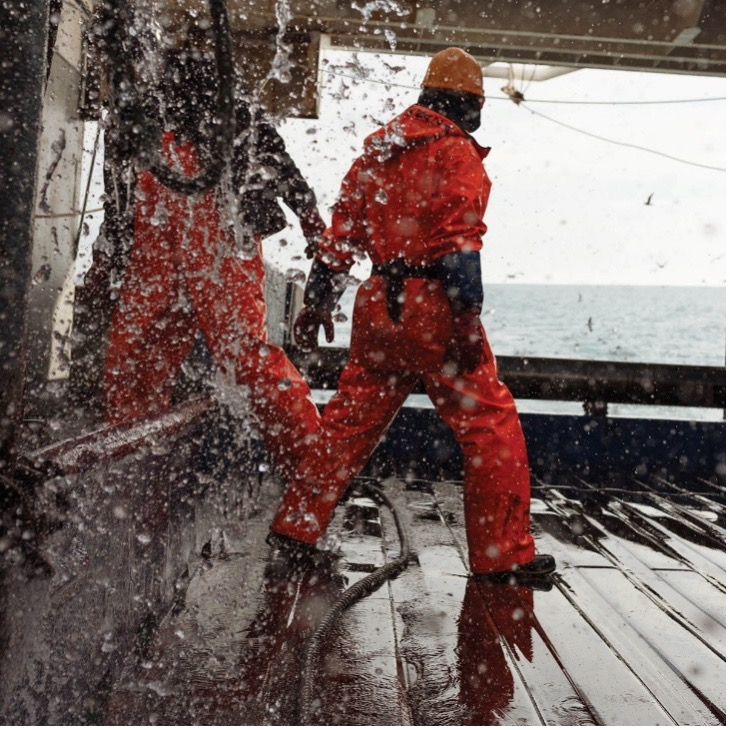
A skipper, a captain, a principled leader, the memory of Valentin Vladimirovich Korotich (1941 – 2013) lives on as the namesake for Norebo's newest vessel: Captain Korotich, which was constructed in February this year. A pillar of the local community, Korotich worked in Kamchatka's fishing industry in Russia for over forty years. In his time, he witnessed his crews demonstrate impressive production results and even become the winners of Soviet-style workplace competitions. But as his career progressed, Korotich also saw a series of changes sweep Russia's fishing industry.
Indeed, for most of history, life at sea could be as turbulent as the ocean's roughest waters. Long days, working in cramped conditions, with no means of communicating with loved ones at home, the fishing industry was reserved for the hardiest of workers. But soon, a sea change was on the horizon.
Today, the Russian seafood industry that exports $5 billion of goods per annum is steeped in heritage and tradition but is embracing new technology, international employment standards, and increased safety vigilance to ensure the industry continues to prove attractive to future generations.
Working in the fishing industry may still involve hard work and sometimes long days. But fishing trips are now far shorter than they once were. In decades past, crewmembers could work for up to 8 to 9 months at sea. Now, rotations span an average of 2 to 3 months, with crewmembers enjoying extended leave once back onshore.
The fishing industry is also much safer than it once was, following the adoption of international treaties such as the 1974 International Convention for the Safety of Life at Sea (SOLAS). Covering about 99% of merchant ships worldwide, SOLAS ensures all vessels on the sea, including commercial trawlers and long-liners, meet the convention's requirements. With lifeboats, radio equipment, and fire safety provisions mandatory, the risk inherent in a life at sea can be successfully mitigated.
Another key development driving the dramatic improvement in working conditions are the advancements made on the fishing vessels. Indeed, it is now common for Wi-Fi to be available on board, enabling crewmembers to stay in touch with friends and family at home. Fishing vessels have also come to be designed with comfort in mind. For example, Norebo'snew trawlers Captain Korotichwill have a capsule-shaped hull with an Enduro Bow type of bow line to create more spacious working conditions on board. The same vessel has also been designed to increase energy efficiency, meaning that the heat generated during the operation of the main engine can now be redistributed to heat rooms aboard the ship, including the cabins.
Working at Norebo does not only bring opportunities to enjoy the comforts of modern vessels. In fact, Norebo prides itself on its employee benefits, offering a package that includes competitive salaries, professional training opportunities and life insurance. In this way, Norebo exemplifies the pace of change witnessed in Russia's fishing industry.
With the chance to travel the world and enjoy a life of adventure, life at sea is clearly much safer and more comfortable than when Valentin Vladimirovich Korotich began his career. But crucially, working in Russia's fishing industry is also more profitable than it once was. Indeed, it is now often the case that crewmembers receive a generous salary, far higher than the national average.
There are also numerous opportunities for progression, with apprenticeships, qualifications, and short courses available to help staff improve their knowledge and proficiency in the industry to fast track their careers.
In light of these developments, it is clear that working in Russia's fishing industry is significantly more attractive than it once was. While the industry produces a clear sense of community, with many crewmembers enjoying the camaraderie often present on board, developments in technology and international treaties have enabled Russia's fishing industry to evolve and strengthen, with working conditions now far improved.
With growing importance of sustainability and long-term management of fish stocks, this makes now an opportune moment to consider joining the fishing industry, with those interested set to enjoy a varied, exciting and prosperous career. All aboard!








